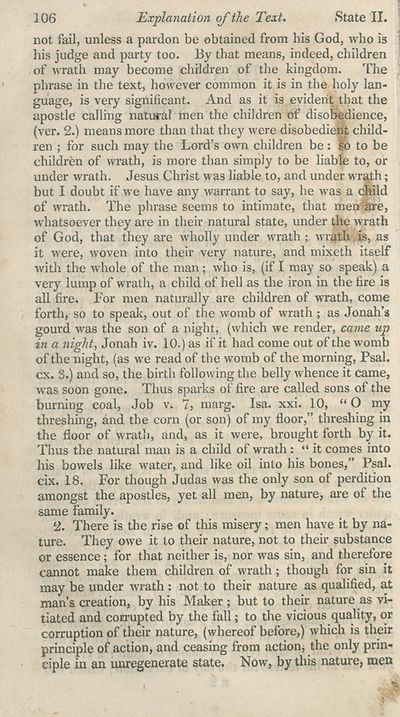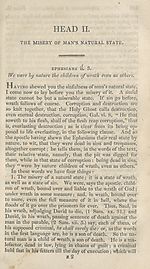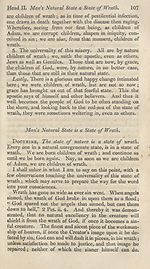Download files
Complete book:
Individual page:
Thumbnail gallery: Grid view | List view

106 Explanation of the Text. State II. 1
not fail, unless a pardon be obtained from bis God, who is ]
his judge and party too. By that means, indeed, children
of wrath may become children of the kingdom. The
phrase in the text, however common it is in the holy lan¬
guage, is very significant. And as it is.eviderit that the
apostle calling natural men the children of disobedience,
(ver. 2.) means more than that they were disobedient child¬
ren ; for such may the Lord’s own children be : |o to be
children of wrath, is more than simply to be liable to, or
under wrath. Jesus Christ was liable to, and under wrath;
but I doubt if we have any warrant to say, he was a child
of wrath. The phrase seems to intimate, that men&re,
whatsoever they are in their natural state, under the wrath
of God, that they are wholly under wrath ; wrath. is, as
it were, woven into their very nature, and mixeth itself
with the whole of the man; who is, (if I may so speak) a
very lump of wrath, a child of hell as the iron in the fire is
all fire. For men naturally are children of wrath, come
forth, so to speak, out of the womb of wrath ; as Jonah’s
gourd was the son of a night, (which we render, came up
in a night, Jonah iv. 10. ) as if it had come out of the womb
of the night, (as we read of the womb of the morning, Psal.
cx. 3.) and so, the birth following the belly whence it came,
was soon gone. Thus sparks of fire are called sons of the
burning coal, Job v. 7, marg. Isa. xxi. 10, “ O my
threshing, and the corn (or son) of my floor,” threshing in
the floor of wrath, and, as it were, brought forth by it.
Thus the natural man is a child of wrath: “ it comes into
his bowels like water, and like oil into his bones,” Psal.
cix. 18. For though Judas was the only son of perdition
amongst the apostles, yet all men, by nature, are of the
same family.
2. There is the rise of this misery; men have it by na¬
ture. They owe it to their nature, not to their substance
or essence; for that neither is, nor was sin, and therefore
cannot make them children of wrath; though for sin it
may be under wrath : not to their nature as qualified, at
man’s creation, by his Maker ; but to their nature as vi¬
tiated and corrupted by the fall; to the vicious quality, or
corruption of their nature, (whereof before,) which is their
principle of action, and ceasing from action; the only prin¬
ciple in an unregenerate state. Now, by this nature, men
not fail, unless a pardon be obtained from bis God, who is ]
his judge and party too. By that means, indeed, children
of wrath may become children of the kingdom. The
phrase in the text, however common it is in the holy lan¬
guage, is very significant. And as it is.eviderit that the
apostle calling natural men the children of disobedience,
(ver. 2.) means more than that they were disobedient child¬
ren ; for such may the Lord’s own children be : |o to be
children of wrath, is more than simply to be liable to, or
under wrath. Jesus Christ was liable to, and under wrath;
but I doubt if we have any warrant to say, he was a child
of wrath. The phrase seems to intimate, that men&re,
whatsoever they are in their natural state, under the wrath
of God, that they are wholly under wrath ; wrath. is, as
it were, woven into their very nature, and mixeth itself
with the whole of the man; who is, (if I may so speak) a
very lump of wrath, a child of hell as the iron in the fire is
all fire. For men naturally are children of wrath, come
forth, so to speak, out of the womb of wrath ; as Jonah’s
gourd was the son of a night, (which we render, came up
in a night, Jonah iv. 10. ) as if it had come out of the womb
of the night, (as we read of the womb of the morning, Psal.
cx. 3.) and so, the birth following the belly whence it came,
was soon gone. Thus sparks of fire are called sons of the
burning coal, Job v. 7, marg. Isa. xxi. 10, “ O my
threshing, and the corn (or son) of my floor,” threshing in
the floor of wrath, and, as it were, brought forth by it.
Thus the natural man is a child of wrath: “ it comes into
his bowels like water, and like oil into his bones,” Psal.
cix. 18. For though Judas was the only son of perdition
amongst the apostles, yet all men, by nature, are of the
same family.
2. There is the rise of this misery; men have it by na¬
ture. They owe it to their nature, not to their substance
or essence; for that neither is, nor was sin, and therefore
cannot make them children of wrath; though for sin it
may be under wrath : not to their nature as qualified, at
man’s creation, by his Maker ; but to their nature as vi¬
tiated and corrupted by the fall; to the vicious quality, or
corruption of their nature, (whereof before,) which is their
principle of action, and ceasing from action; the only prin¬
ciple in an unregenerate state. Now, by this nature, men
Set display mode to:
![]() Universal Viewer |
Universal Viewer | ![]() Mirador |
Large image | Transcription
Mirador |
Large image | Transcription
| Antiquarian books of Scotland > Religion & morality > Human nature in its fourfold state > (124) |
|---|
| Permanent URL | https://digital.nls.uk/118585184 |
|---|
| Description | Thousands of printed books from the Antiquarian Books of Scotland collection which dates from 1641 to the 1980s. The collection consists of 14,800 books which were published in Scotland or have a Scottish connection, e.g. through the author, printer or owner. Subjects covered include sport, education, diseases, adventure, occupations, Jacobites, politics and religion. Among the 29 languages represented are English, Gaelic, Italian, French, Russian and Swedish. |
|---|

